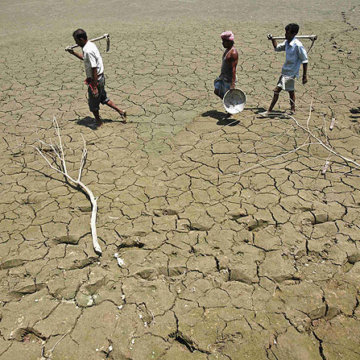- About
- Topics
- Picks
- Audio
- Story
- In-Depth
- Opinion
- News
- Donate
- Signup for our newsletterOur Editors' Best Picks.Send
Read, Debate: Engage.
Madhya Pradesh, the central Indian state, has a population greater than many countries. At 75 million people, if we conceive of it as a stand-alone nation, it would be the 18th largest country in the world, right between Iran and Turkey.
The 18th largest country in the world is failing.
Not because of war or terrorism, but because it hasn’t rained in 2 years. Madhya Pradesh, like much of South East Asia is dependent on the rainy season for its ecosystem to flourish. 2014 and 15, being two of the hottest years on record globally, also meant that they produced very poor monsoons.
The Indian government has said that it is one of the worst water crises it has ever faced, and that more than 330 million people, with the neighboring states to Madhya Pradesh also at risk. That’s a third of the country’s population, or in a global context, roughly 5% of the world’s population.
Bans on daytime cooking have been imposed, as have bans on unnecessary water usage (in this context, showering) and dams are being protected by armed guards. It is the first set of moves in a typical conflicts which emerge over land and water resources: First the government tries to contain the situation through policy, then tries to de-escalate the situation through controlling resources with weapons. It might seem brutal, but it’s necessary, since control of resources is normally a major point of conflict for rival groups, particularly in rural settings.
Pakistan has also been facing a nation-wide shortage over the past few months – an definite indication that the entire sub-continent is suffering, and that it is not merely an isolated water shortage.
The drought has not only caused deaths across the sub-continent, but it has prompted major upheavals, with rural laborers venturing into cities to find work. This has also put a strain on cities, and unfortunately, both India and Pakistan has seen a sharp rise in the number of suicides – the personalization of a structural, and natural problem.
While there is no immediate way to help people suffering from water shortage, there are donations we can make to organizations like Water for People which can provide further information and help.
And of course there’s supporting a green lifestyle, which should help mitigate, however slightly, the causes of man-made climate change.
We can otherwise only watch as the world’s 2nd largest country dries up.
